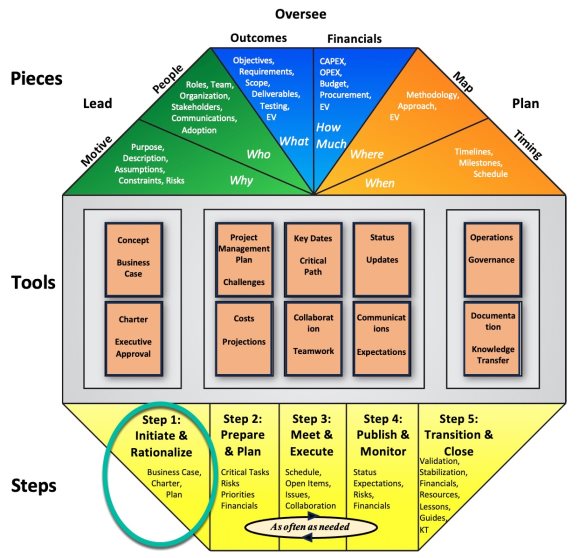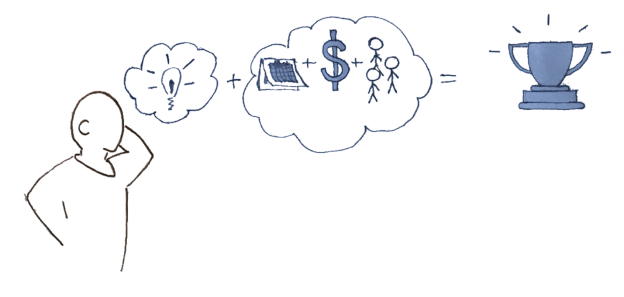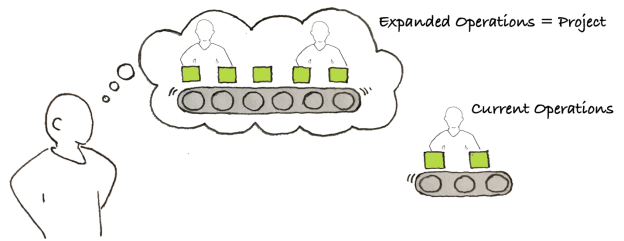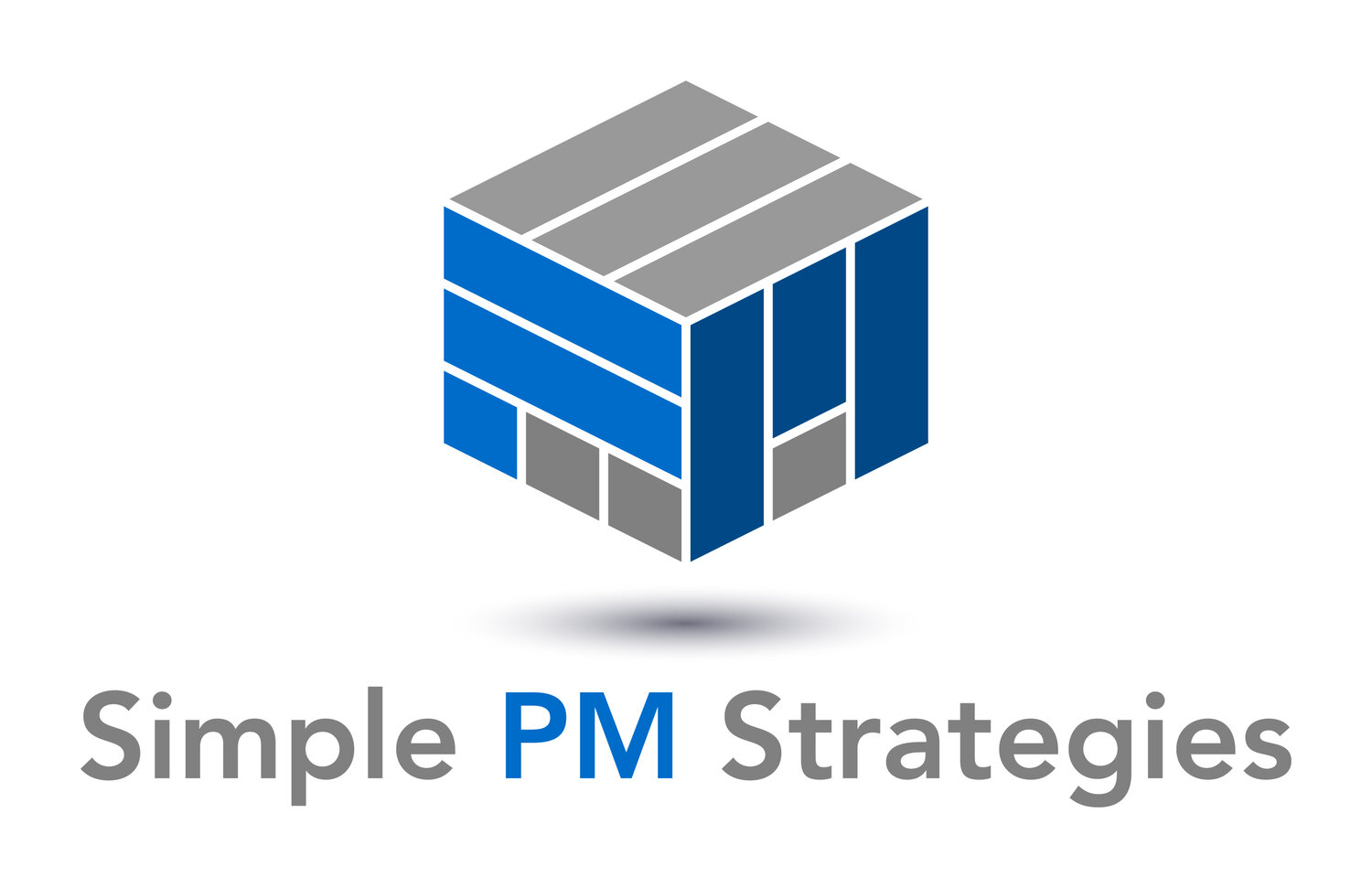3 Critical Differences to Know Between Projects and Operations
The purpose of this article is to help you know what a project is and lay out the differences between project work and operational work. This helps you with project readiness, which is under INITIATE and RATIONALIZE (Step 1) in the MPM model.

Project readiness is in INITIATE and RATIONALIZE (Step 1)
What is a Project?
Speaking simply, a “Project” is a set of actions that achieves a specific purpose, is completed by a certain date, assigned dedicated costs, utilizing particular resources; and it’s a temporary endeavor, not on-going.

Timelines, costs, and resources are all factors in a project.
Imagine you have to buy a car. This is a one-time purchase, and you need it by the time winter rolls around.
You contact your friends and family, asking for advice and technical assistance (from the people who know cars), visiting multiple dealerships and looking for that perfect car.
Eventually you make your choice, sign up for financing, and purchase it. Now you have bought a car and you have also completed a real-life project.
Key Characteristics of Projects
Projects share several characteristics, and if you understand them – it will be easier for you to define and manage your project.
Characteristic 1: Projects are Temporary
Projects are temporary, with defined start and end dates, and not part of normal, day-to-day operations. After the project is done, the change it has brought transitions into an ongoing steady state.
As an example, if you’re buying a car, you only want to do it once. The plan isn’t to trade your car in for a new one every day, evaluating each model, negotiating with a different dealership each time, and filling out a new set of registration papers. Ideally, you’ll purchase a car and then be able to drive it, with occasional maintenance concerns.
Since the project is using costs, resources and time to change a business, whether sanctioned or unofficial, it is important for a manager to verify project expectations.
If we applied this to our car purchase – do you have a budget? What about a timeframe? If you’re bringing your best friend with you to look at cars or haggle with salespeople, do you know her availability? What about the makes and models that she knows best, or the back-up car person who can come with you if she’s busy?
Characteristic 2: Project Outcomes Change Operations
When an organization wants to change how they operate, they initiate the change with a project. The vision a project delivers, what it orchestrates, its concrete outcomes – whatever we call the project results, they will change how the business operates.
Going back to our car-buying analogy, before you buy the car, you need to drive your old car, with its leaky oil pan and bald tires. You want to drive a new car – it will be safer in the winter, and better on gas. But to get to that new-car state, you need to get the new car. This is where the car-buying project comes in.
Developing the project charter, the deliverable from the Initiate part of a project, is something you do to verify your understanding and assumptions regarding costs, staffing, timing, and outcome.
It doesn’t matter who the project is meant to serve, or who you’re reporting to. A charter is essential to beginning your project.
It helps you frame the change you’re going to be creating to make sure it’s really what you want before all of the commitments are made.

Projects change the operations of a business
Characteristic 3: Project Costs Are Different from Current Operational Costs
It’s important to recognize what is counted as the project, and what is not. Buying your car is one enclosed event. The maintenance, anything that happens afterwards, any follow up costs – those are all outside of your project and are your operational costs once you’ve purchased the vehicle.
When you are planning your project, remember that there will be operational costs afterwards. It’s tempting to think of your project as finished and any change that comes out of it as being easy to roll out – don’t make that mistake.
Your operational costs will often be higher than the project costs, depending on the type of project and the magnitude and type of the change.
Project change is permanent, so the stakes are high. If you write a charter, it will help you make sure that the solution fits your needs best and is the most appropriate solution.
Knowing What to Expect When You Start Your Project: The Questions
Keep the project characteristics in mind when you’re developing your project, because they will help you understand the difference between a project and an operational process.
Sometimes projects and operations are confused. If you want more examples of the differences between projects and other kinds of initiatives you might encounter in your organization, this is covered in an another article, but it is also covered here in this free downloadable PDF, which also has some great exercises.
Summary
There are three critical differences between project work and operational work.
- Projects are temporary.
- Project outcomes change operations.
- Project costs are different from current operational costs.
Understand and know the differences to separate commitments for money, resources and time.
Action Steps / Apply This Knowledge
- Review current project costs, especially operational costs and ensure these are separate from current operational costs.
- Look at each the budget for each project you have. Is there a post-project operational budget amount? There should be one because usually money is needed to support a change, even if it is a reduction in costs.
- Look at each budget and determine if any capital costs have a depreciation component that needs to be reported to the finance team. If so, then it is important to record the day that project outcome transition from the project to operations.
- Prompt engineering guidance for AI GPTs such as chatGPT: I’m a business leader who is about to start managing a project that is delivering X into a Y type of company. What are some ways to describe the difference between the project work and operational work for this kind of company?”
Learn More to Do More
Check out the learning hub which presents other project concepts from a project knowledge awareness standpoint: https://simplepmstrategies.com/learning-hub-index
INITIATE – Operations vs Projects
© Simple PM Strategies 2024
